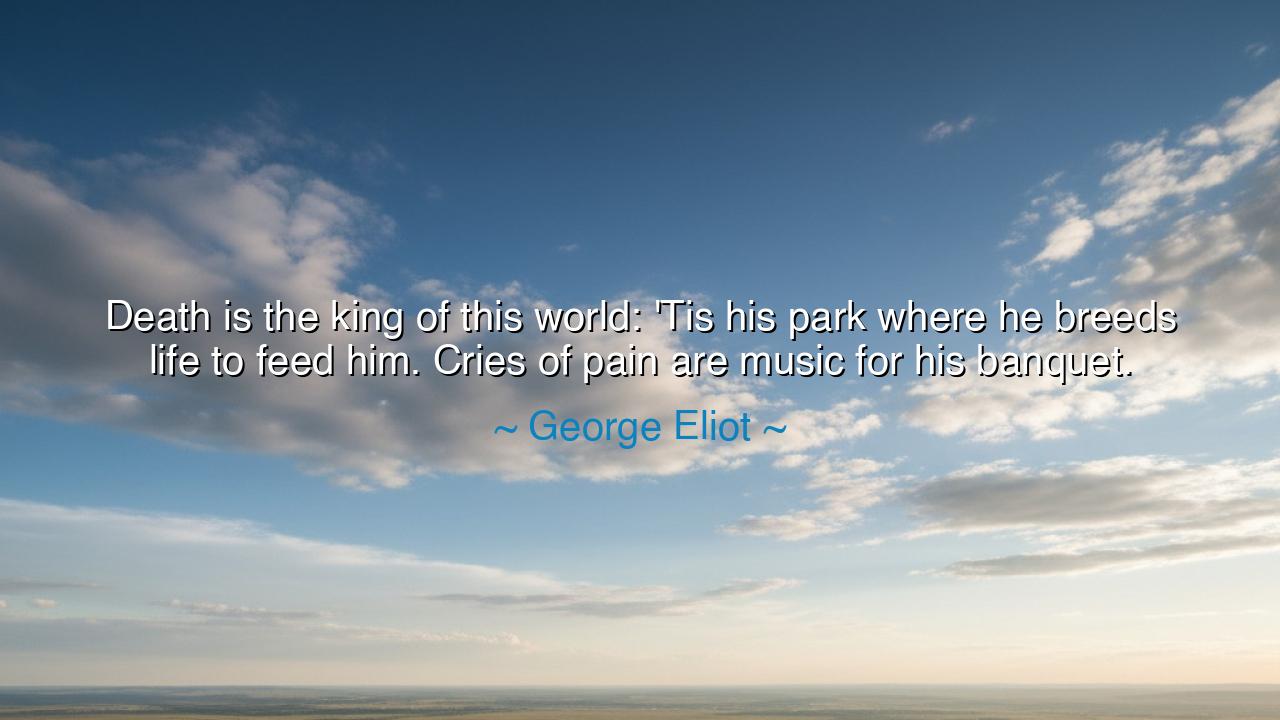
Death is the king of this world: 'Tis his park where he breeds
Death is the king of this world: 'Tis his park where he breeds life to feed him. Cries of pain are music for his banquet.






The words of George Eliot — “Death is the king of this world: 'Tis his park where he breeds life to feed him. Cries of pain are music for his banquet.” — resound like an ancient psalm carved in stone, both terrible and true. In this haunting reflection, Eliot does not glorify despair, but unveils a vision of existence where life and death are not enemies, but partners in an eternal cycle. Her voice, both poetic and prophetic, reminds us that the world itself is the dominion of mortality — that every breath we take feeds the great rhythm of creation and decay. She gazes without flinching into the abyss, yet her words are not nihilistic; they are an acknowledgment of the sacred law of transience that governs all living things.
To say that “Death is the king of this world” is to recognize that mortality reigns over all. Kings and peasants, beasts and flowers, nations and empires — none escape his rule. Death sits enthroned not as a tyrant of cruelty, but as the inevitable ruler of nature’s balance. For every seed that sprouts, another must wither; for every birth, a passing; for every dawn, a dusk. Eliot, in her wisdom, saw this truth not as a curse, but as the architecture of existence. Without death, there is no renewal; without pain, no depth; without ending, no meaning. Her words carry the solemn acceptance that life itself is nourished by loss, that even our suffering becomes the strange music of the world’s continuity.
Yet Eliot does not stop at philosophy — she delves into the human heart. “Cries of pain are music for his banquet.” This is the voice of one who has witnessed grief and dared to name it. She is not cruel in saying so; rather, she mourns the cruel beauty of the universe itself. Every creature, in living, becomes part of death’s feast — feeding, through its struggle and sorrow, the endless wheel of being. And yet, in acknowledging this, Eliot reveals a paradox: that our cries of pain, our tears, our fleeting joys — all are part of a larger harmony that transcends us. We may rage against the king, but we are also his children, born of his rule and destined to return to his silence.
History, too, bears witness to this truth. Consider the field of Waterloo, or the ashes of Pompeii, or the broken cities of the modern age. From every ruin, life emerges anew — weeds push through the stone, civilizations rebuild, and the human spirit rises again. Even in the shadow of World War II, when death seemed to cover the earth, the survivors rebuilt a world from the bones of the old one. This is the cycle Eliot speaks of — where death breeds life to feed him, where destruction and creation are woven together in an eternal embrace. The cries of history become the chorus of existence, and though they bring sorrow, they also bear witness to resilience.
In the ancient myths, death was never the enemy of life, but its complement. The Egyptians revered Osiris, lord of the underworld, as the god of rebirth. The Greeks spoke of Persephone, whose descent into darkness brought about the seasons. Even in the East, the wheel of samsara turns unceasingly — death leading to life, life leading to death. Eliot’s quote, born from the fires of Victorian realism and philosophical depth, speaks with the same eternal voice. It reminds us that mortality is not an error, but the design; that death’s dominion, though fearful, is also the source of meaning and renewal.
The lesson, then, is not to despair before death’s kingship, but to live more fiercely because of it. If all things perish, then every act of kindness, every spark of courage, every whisper of love becomes sacred. Knowing that death feeds upon life should not paralyze us — it should awaken us. For while we cannot escape the banquet, we may choose how we sing our part in its music. Our cries need not be only of pain; they can also be of wonder, gratitude, and defiance.
Therefore, let this teaching be carried in your heart: do not curse death, but understand him. He is the silent companion of life, the shadow that makes light visible. Walk in the world knowing its impermanence, and you will walk wisely. Mourn, yes — but let your mourning be filled with reverence for the mystery that consumes and renews all things. As Eliot knew, the world belongs to death — yet through our love, our courage, and our compassion, we remind death himself that even in his kingdom, life sings.
For in the end, though death is king, the soul that lives fully — that dares to love and to suffer — becomes something death cannot devour: a spark of consciousness that, though brief, illuminates eternity.






AAdministratorAdministrator
Welcome, honored guests. Please leave a comment, we will respond soon